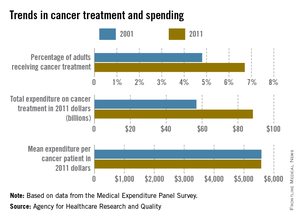A 55% jump in total expenditures for cancer treatment from 2001 to 2011 appears to reflect an increase in the number of patients, not an increase in the cost of treating those patients, according to a report from the Agency for Healthcare Research and Quality.
Total U.S. spending on cancer treatment increased from $56.8 billion in 2001 (adjusted to 2011 dollars) to $88.3 billion in 2011. Over the same period, the percentage of adults who were treated for cancer increased from 4.8% in 2001 to 6.7% in 2011. The mean expenditure on treatment for patients with cancer, on the other hand, dropped by $8 a patient: from $5,583 in 2001 to $5,575 in 2011, the AHRQ report showed.
Looking at the components of per-patient spending, expenditures for hospital stays dropped from $2,604 in 2001 to $1,956 in 2011, expenditures for ambulatory visits increased from $2,509 to $2,769, expenditures for retail prescription medicines jumped from $201 to $634, and home health expenditures dropped from $232 to $185, according to the AHRQ.
The overall spending on ambulatory visits increased from $25.5 billion in 2001 to $43.8 billion in 2011; the overall spending for hospital stays rose from $26.5 billion to $31 billion; expenditures for prescription medicines shot from $2 billion to $10 billion; and home health spending rose from $2.4 billion to $2.9 billion, the report said.
The report, "Trends in Use and Expenditures for Cancer Treatment among Adults 18 and Older, U.S. Civilian Noninstitutionalized Population, 2001 and 2011," used data from the household component of the Medical Expenditure Panel Survey. All costs were expressed in 2011 dollars.


